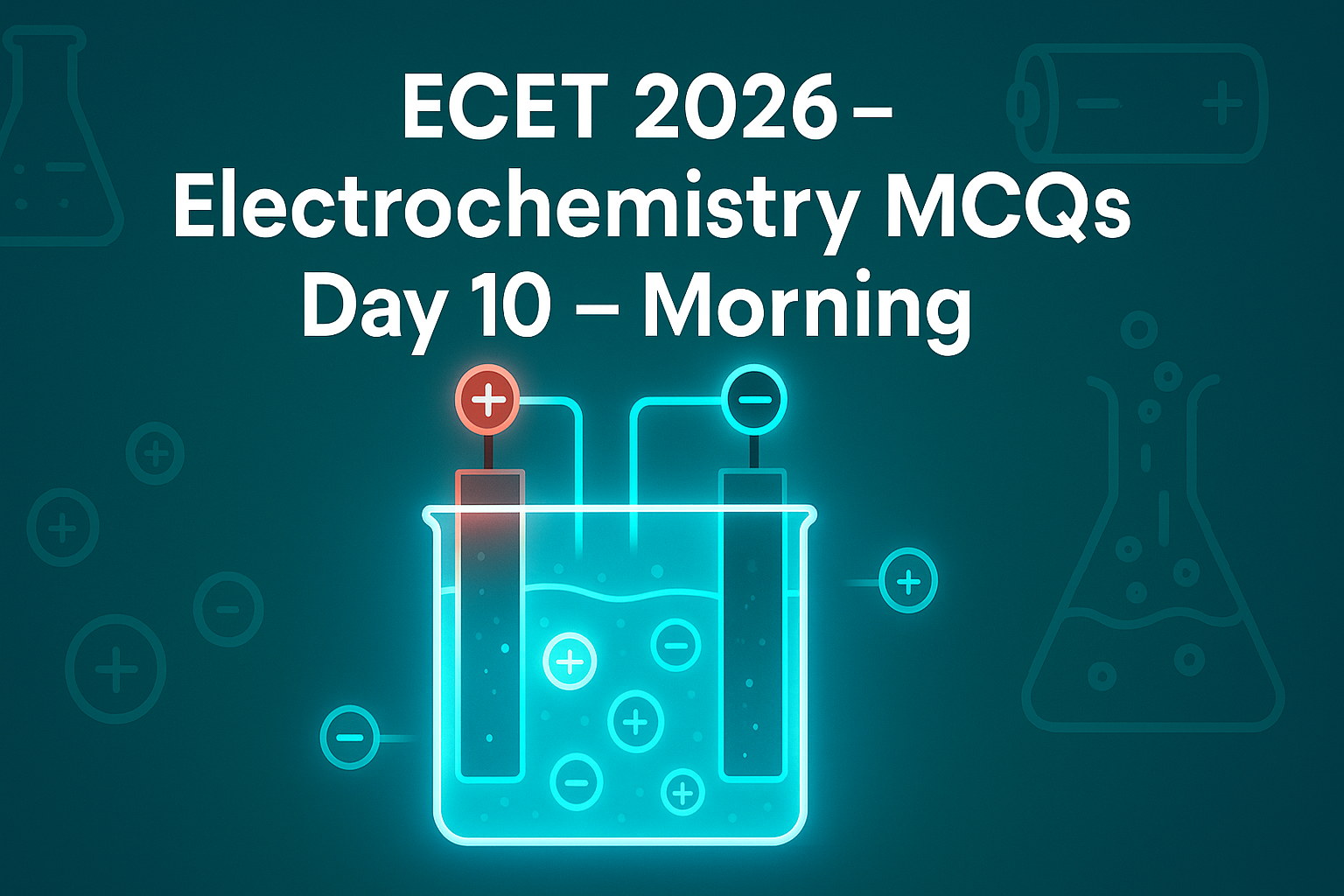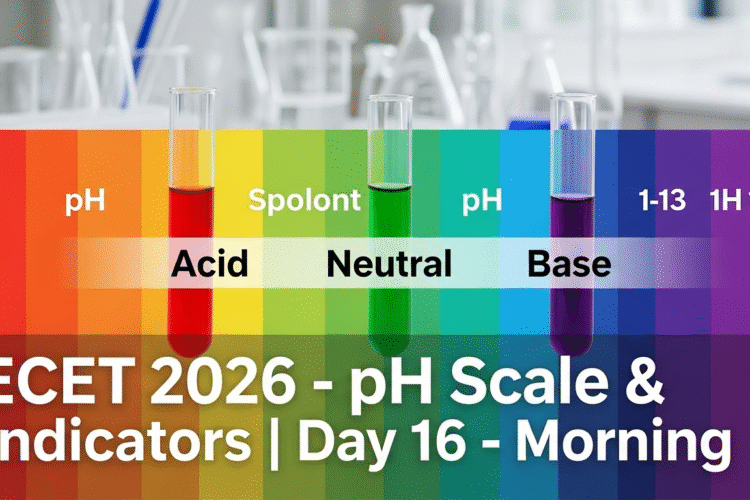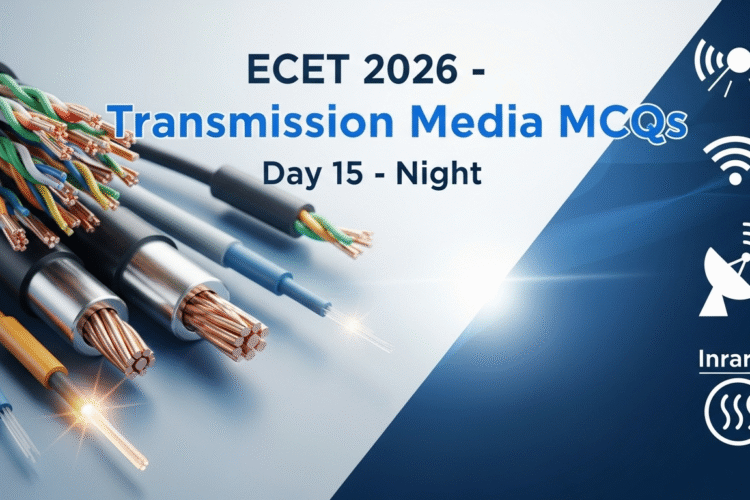
In the ECET 2026 Chemistry section, topics like Electrochemistry are small but scoring units, especially for CSE diploma students. Understanding how electricity and chemical reactions are related helps in many areas of science and engineering. The questions from this topic are usually basic concept-based, making it a great opportunity to secure marks easily. Let’s dive into the fundamentals of Electrochemistry, followed by 10 smartly selected MCQs with answers and explanations.
📘 Concept Notes – Electrochemistry Basics
⚡ What is Electrochemistry?
Electrochemistry is the branch of chemistry that deals with the relationship between electricity and chemical reactions. It focuses on how redox reactions either produce electricity or are driven by it.
🔌 Key Terms & Concepts:
- Redox Reaction:
- Oxidation: Loss of electrons
- Reduction: Gain of electrons
- Electrolyte:
- A substance that conducts electricity in solution (like NaCl, H₂SO₄)
- Electrolysis:
- Process where electrical energy is used to bring about a chemical change.
- Electrochemical Cell:
- A device that converts chemical energy into electrical energy.
- Example: Galvanic (Voltaic) Cell
- Electrolytic Cell:
- Converts electrical energy into chemical energy.
- Anode vs. Cathode:
- Anode: Oxidation occurs, electrons are released
- Cathode: Reduction occurs, electrons are accepted
- Applications:
- Batteries, Electroplating, Electrolysis of water, Purification of metals
🧪 Real-Life Examples:
- Batteries work based on electrochemical cells.
- Electroplating coats metals using electrolysis.
- Water electrolysis produces hydrogen and oxygen gases.
🔟 10 Most Expected MCQs – ECET 2026 [Electrochemistry Basics]
Q1. What is the process of using electricity to bring a chemical change?
A) Galvanization
B) Electrolysis
C) Sublimation
D) Sedimentation
Q2. Which of the following is an electrolyte?
A) Distilled water
B) Sugar solution
C) Sodium chloride solution
D) Alcohol
Q3. In an electrochemical cell, oxidation occurs at the:
A) Cathode
B) Salt bridge
C) Electrolyte
D) Anode
Q4. Which device converts chemical energy to electrical energy?
A) Transformer
B) Electrolytic cell
C) Electrochemical cell
D) Diode
Q5. What ions move towards cathode in electrolysis?
A) Negative ions
B) Positive ions
C) Electrons
D) Gases
Q6. The process of coating a metal with another using electricity is called:
A) Corrosion
B) Electroplating
C) Galvanization
D) Sublimation
Q7. Which of the following is not a redox reaction?
A) Rusting of iron
B) Electrolysis of water
C) Neutralization
D) Battery discharge
Q8. Which electrode is positive in an electrolytic cell?
A) Cathode
B) Anode
C) Both
D) None
Q9. In electrolysis of water, which gas is released at the cathode?
A) Oxygen
B) Hydrogen
C) Nitrogen
D) Carbon dioxide
Q10. What is the medium that allows ion flow in an electrochemical cell?
A) Wire
B) Electrode
C) Salt bridge
D) Insulator
✅ Answer Key Table
| Q.No | Answer |
|---|---|
| Q1 | B |
| Q2 | C |
| Q3 | D |
| Q4 | C |
| Q5 | B |
| Q6 | B |
| Q7 | C |
| Q8 | B |
| Q9 | B |
| Q10 | C |
🧠 Explanations of All Answers
- Q1 → B: Electrolysis uses electric current to cause chemical reactions.
- Q2 → C: NaCl solution conducts electricity (electrolyte).
- Q3 → D: Oxidation occurs at the anode.
- Q4 → C: Electrochemical cell converts chemical energy into electrical energy.
- Q5 → B: Positive ions are attracted to the cathode (negative electrode).
- Q6 → B: Electroplating is coating metal using electric current.
- Q7 → C: Neutralization is not a redox reaction.
- Q8 → B: In an electrolytic cell, anode is positive.
- Q9 → B: Hydrogen gas is released at cathode during water electrolysis.
- Q10 → C: Salt bridge maintains ion flow and completes the circuit.
🎯 Why This Practice Matters for ECET 2026
Electrochemistry topics are simple, concept-based, and often appear in the general science part of ECET papers. Mastering basics like electrodes, redox, and electrolysis ensures quick recall and easy marks. These are high-scoring questions that you can answer in less than 30 seconds with practice!
📲 Join Our ECET Prep Community on Telegram
Get free MCQs, flashcards, notes, and daily tests directly on your mobile.
👉 Join here: @LearnNewThingsHub
Let’s learn smarter – together!
![]()



